Access to funding is biggest barrier for Black entrepreneurs
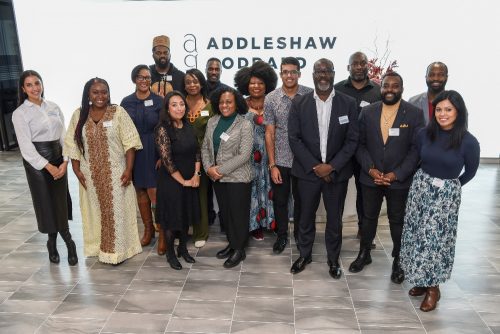
Access to funding – whether that’s securing bank loans or investment – is still one of the biggest barriers to growth for today’s Black entrepreneurs.
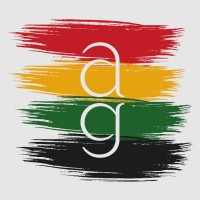
Attendees at the roundtable agreed that access to funding remained a huge challenge.
Over the past decade, only 0.24% of VC funding invested in UK start-ups went to Black entrepreneurs and according to research from the British Business Bank, access to finance appears to be a major barrier for Black, Asian, and other ethnic minority entrepreneurs, and the reason why 39% and 49%, respectively, stop working on their business idea.
Mental health nurse turned entrepreneur Dami Soyoye spoke of the funding inequalities.
Dami is co-founder of Nubian Mumpreneurs Club and BuildHerCrowd, a crowdfunding platform dedicated to empowering black women.
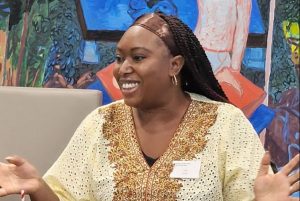
Dami Soyoye
She said: “We know that less than 1% of VC goes to people of colour, I’m going to dial that back even more. For Black women, that figure is 0.001, and that was part of the reason I wanted to do something about it.
“At the start of the pandemic, I launched BuildHerCrowd, a crowdfunding platform for black women to come together to provide funding for our own projects. If we’re not going to get it from the banks, we’re going to look inwards and provide it for ourselves.”
Even attempting to open a business bank account with a high street bank can also be challenging.
“It took me weeks to open an account because of my Nigerian passport,” said Dami’s husband Akin, founder of IbileCoin, a pan African cryptocurrency which he launched to give African people more financial control.
“We need financial empowerment in this community to help drive us forward,” he said.
“It’s one of the reasons why we set up an African cryptocurrency. The high street banks are not doing enough, and they need to be accountable when it comes to helping people of colour with funding.”
Monique Kufuor, founder of BOB Expo (Black Owned Business Exhibition), said: “We know many businesses who have applied for a loan but have been rejected not knowing the reasons why.
“For many in the Black community, but not all, income is different to their white counterparts.
“For example, many people send a lot of their income to support families back in Africa, so finances are not the same.”
Jamaal Braithwaite, founder of Manchester-based careers platform, Jobseekrs, is close to raising £2.5m in investment. But his journey to securing investment hasn’t been easy.
The recent funding pledge has come from overseas investors as he found a lack of willingness to invest from UK VCs.
He said: “For my first start-up, NextGen, it took me 54 tries before I raised my first investment of £50,000. So, it’s been really difficult in this country to raise funds, which is why now my preference is to go outside of the UK to raise investment in countries like the Middle East, Asia, and the US.
“We are working hard to change this and to make it easier for Black entrepreneurs, but it’s going to take time for change here because things haven’t moved on.”
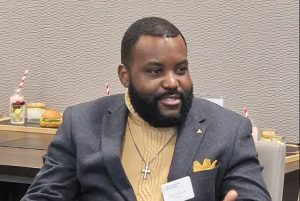
Jamaal Braithwaite
He added: “This is why it’s great to get together with businesses at roundtables like this so that entrepreneurs can speak about their challenges and we can then help each other. If someone wants to raise investment, I can now tell them where they need to go or who they can speak to.”
Harold Brako, Partner and Head of Manchester Office at Addleshaw Goddard, said it was important to share knowledge within networks to help people understand how they can access services, whether that’s raising finance or helping to launch a new product.
He said: “One of the things I notice when people come to me for advice is that they’re stuck in this paralysis because they don’t have the knowledge. I know someone who’s got one of the best ground-breaking ideas ever, but she doesn’t know how to get it off the ground, how to get funding, and how to get noticed.
“So, the difficulty is, a lot of people don’t have that knowledge, so we need to make sure that through our network we share what we know.”
He continued: “By bringing together ethnically diverse businesses we can highlight their ideas, their journey so far and see what the challenges are so that we can start to come up with solutions.”
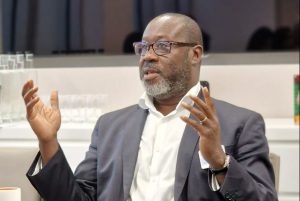
Harold Brako
Lee Chambers, founder of successful workplace wellbeing business, Essentialise, said there was onus on them (the black community) to inspire the next generation of young Black people.
Lee, who this month was inducted into the Black Cultural Archives, said: “Too often we are more likely to go and ask our family for support rather than access those systems and structures and that’s because of the systemic issues within them.
“But in some ways, we have to be the ones who dismantle those systemic issues so the next generation can see what we are, see what we have achieved, can feel that they have some representation, and inspire them on to that pathway.”
He added: “If you think about the communities that have come here, whether that’s our grandparents, or those who have come to the UK more recently, they are entrepreneurial by nature. They come here to work, they come to build a business, to build tech, to build a successful life. We have the entrepreneurial spirit within us.
“So, we need to celebrate that, educate young people about the opportunities and give young Black people the opportunities to see what they can become.”





